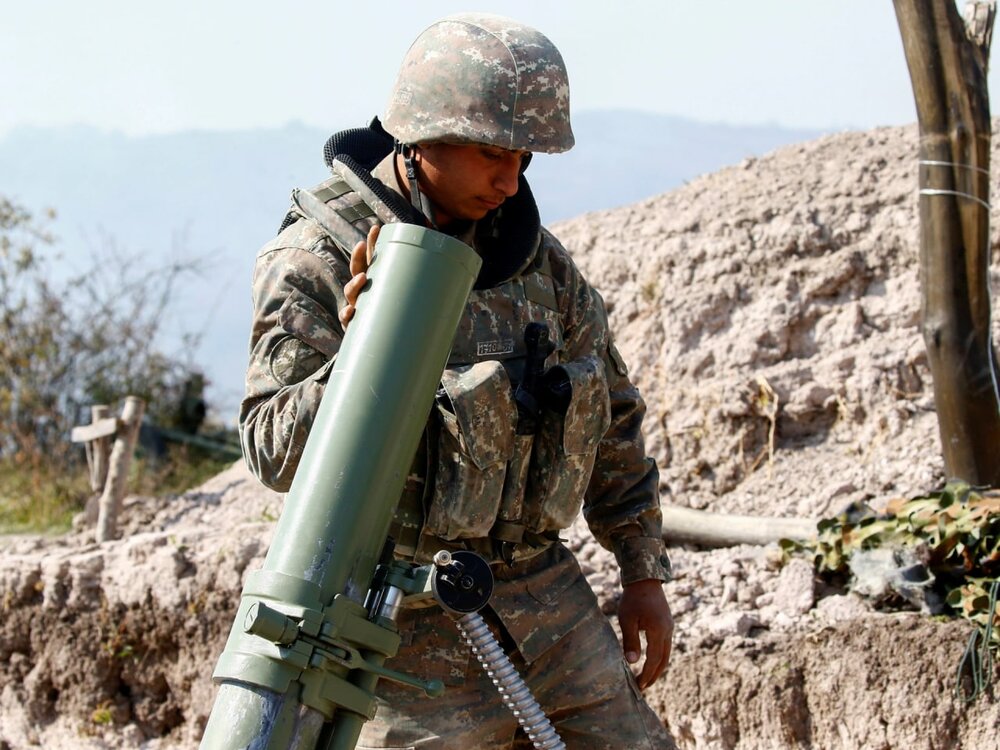Armenia-Azerbaijan clashes sound alarm bells in Tehran

TEHRAN - The new episode of clashes between Armenia and Azerbaijan caused concerns in Tehran over the stability and peace in the strategically important South Caucasus region.
On Monday at late night, heavy clashes broke out along the Armenia-Azerbaijan borders. As usual, the two South Caucasus nations started putting the blame on each other for the flare-up.
Armenian Prime Minister Nikol Pashinyan convened a security meeting of the country’s high-level officials early in the morning on Tuesday. The meeting of Armenia’s Security Council was held with the participation of Armenian President Vahagn Khachaturyan and the President of the National Assembly Alen Simonyan in addition to the Security Council members.
A statement put out by the Armenian premiership said Azerbaijan launched “aggressive actions” against Armenia’s sovereign territory, a move that prompted Yerevan to officially apply to the Russian Federation for the implementation of the provisions of the Treaty of Friendship, Cooperation and Mutual Assistance, to the Collective Security Treaty Organization and the UN Security Council.
On the other hand, Azerbaijan offered a completely different account, saying Armenia launched large-scale provocations in the directions of Dashkasan, Kalbajar and Lachin on the Azerbaijan-Armenia state border. “Death toll of Armenian armed forces amounted to 150-200 people, and hundreds of Armenian soldiers were injured following an unsuccessful provocation attempt against Azerbaijan,” Azerbaijani news agency Trend reported.
Iran, a longtime mediator in the South Caucasus region, was quick to call for peace and dialogue. Nasser Kanaani, the spokesman for the Iranian foreign ministry, expressed concern about the escalation of border tensions and clashes between Yerevan and Baku, calling for restraint and resolution of disagreements between the two countries through peaceful means and based on international law.
He reiterated Iran’s longtime position that international borders in the region must be respected. “Iran considers any change to the borders between the Azerbaijan Republic and the Republic of Armenia as unacceptable,” he said in a statement.
He also said that Iran is closely watching the relevant developments, stressing the need for respect for the territorial integrity of both the Azerbaijan Republic and the Republic of Armenia.
This position was once again reiterated in the phone call between Iranian President Ayatollah Seyed Ebrahim Raisi and Pashinyan. Underling that security in the Caucasus region is very important for the Islamic Republic of Iran, Ayatollah Raisi told Pashinyan, “The Caucasus region is going through special conditions and unfortunately, peace has not returned to this region yet.”
Noting that Iran is watching the situation in the Caucasus region, President Raisi said, “The region cannot tolerate another war.”
He added, “The historical borders of Iran and Armenia are considered the bedrock of prosperity, convergence and security of the region, and Tehran is determined to continue cooperation in all fields for the benefit of the prosperity and stability of the region.”
The latest flare-up once again aroused concern about the possibility of cutting the Iran-Armenia border, something that Iran clearly rejected and continues to reject.
Iran, while seeking good neighborly ties with both Armenia and Azerbaijan, has said that it will not accept any geopolitical changes in the South Caucasus region. The highest political echelons in Tehran have underlined the need to keep the status quo on the Armenia-Azerbaijan border.
The Republic of Azerbaijan has been overtly calling for the establishment of a land corridor linking the autonomous enclave of Nakhichevan to mainland Azerbaijan, which virtually will cut the Iran-Armenia border.
In a July meeting with Russian President Vladimir Putin in Tehran, Leader of the Islamic Revolution Ayatollah Seyed Ali Khamenei made it clear that Iran will not accept such a geopolitical development. “The Islamic Republic will not tolerate policies or plans that lead to the closing of the Iran-Armenia border,” the Leader said.
Ayatollah Khamenei reiterated this position in a separate meeting with Turkish President Recep Tayyip Erdogan. “Of course, if there is a policy intended to block the Iran-Armenia border, the Islamic Republic will oppose it, for this border has been a connecting route for thousands of years,” he said.
Leave a Comment